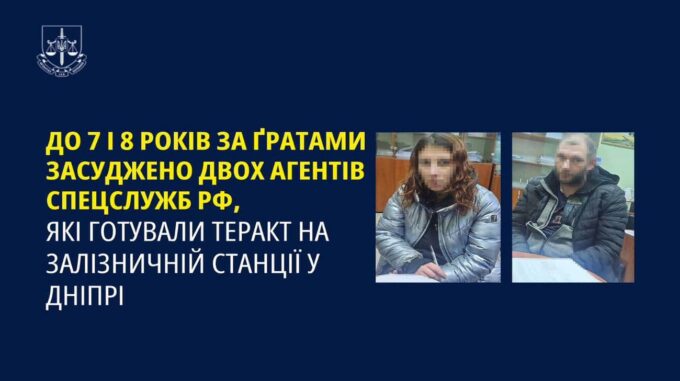In Dnipro, the court has handed down sentences to two residents of the city who, under the instructions of Russian special services, prepared and planned a terrorist act near a railway station

This occurred as part of a large-scale effort by Ukrainian law enforcement agencies to combat the activities of isolated enemy agent networks attempting to destabilize railway transportation and increase tensions in the region. The court proceedings concluded with both local residents—36-year-old man and 23-year-old woman—being sentenced to seven and eight years of imprisonment, respectively. According to the Office of the Prosecutor General of Ukraine, the court found them guilty of aiding terrorist activities and planning a terrorist attack. The accused acted under the instructions of a so-called Moscow curator—a representative from an operational unit in Russia—who assured them funding for executing their criminal tasks. Official information states that during the investigation, it was established that the suspects manufactured a homemade explosive device in their respective apartments—an improvised tool capable of causing significant destruction and human casualties. The conspirators placed the explosive near a railway platform in one of the city’s districts on January 8, 2025, and intended to activate it when the railway line was at its busiest. Fortunately, a timely operation by Ukrainian security services thwarted the criminal and dangerous plan. The ongoing investigative actions enabled operatives to prevent the terrorist act and avoid possible victims and destruction. During the court proceedings, the suspects fully admitted their guilt, which strengthened the judicial assessment of their cases. The sentences were handed down in accordance with Articles 15, 258, and 263-1 of the Criminal Code of Ukraine, which prescribe penalties for complicity in terrorist acts, preparation for a crime, and illegal possession of explosives. This court decision exemplifies how cohesively and effectively Ukrainian law enforcement agencies are working to combat enemy espionage networks. At the same time, this case served as a warning to all potential offenders: any attempt to destabilize the situation in Ukraine will be promptly stopped and severely punished. It is important to note that in April of this year alone, the Security Service of Ukraine detained another Russian spy—a 46-year-old woman suspected of conducting intelligence activities and espionage against the country's military staff. Thanks to the joint efforts of law enforcement agencies and the united resolve of Ukrainian society, the country today demonstrates a firm stance on protecting its citizens and national security. Every arrest and every verdict is a step toward ending a period of terror and subversive activities aimed at sowing chaos and fear within the country. Ukraine will continue to combat all forms of enemy agent networks, ensuring stability and peace for its citizens.

